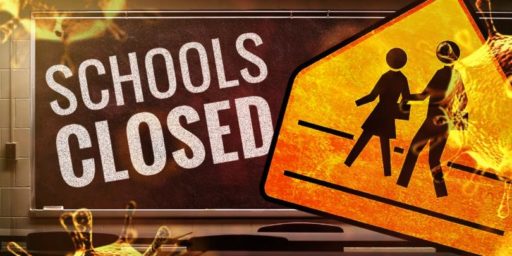Stealing a Good Education?
Parents are being arrested for sending their children to public schools outside their district.
Michael Flaherty points to an increase in parents being arrested for sending their children to public schools outside their district.
These arrests represent two major forms of exasperation. First is that of parents whose children are zoned into failing public schools—they can’t afford private schooling, they can’t access school vouchers, and they haven’t won or haven’t even been able to enter a lottery for a better charter school. Then there’s the exasperation of school officials finding it more and more difficult to deal with these boundary-hopping parents.
From California to Massachusetts, districts are hiring special investigators to follow children from school to their homes to determine their true residences and decide if they “belong” at high-achieving public schools. School districts in Florida, Pennsylvania and New Jersey all boasted recently about new address-verification programs designed to pull up their drawbridges and keep “illegal students” from entering their gates.
Other school districts use services like VerifyResidence.com, which provides “the latest in covert video technology and digital photographic equipment to photograph, videotape, and document” children going from their house to school. School districts can enroll in the company’s rewards program, which awards anonymous tipsters $250 checks for reporting out-of-district students.
It is a bizarre spectacle.
Aside from the unconscionable invasion of privacy in such monitoring, lots of children go from school to homes other than their own because they have two working parents. My kids will likely go to their grandmother’s house, for example.
Additionally, many kids have parents with two houses. Indeed, one of the anecdotes Flaherty cites is of a mother illegally sending her daughters to the school associated with their father’s house. Why shouldn’t she be able to do that? They’re both paying property taxes to support the school; why should where the kids sleep at night matter? What if they have joint custody?
Beyond all that, it is of course problematic that some school districts are so radically better than others that parents would be willing to flout the law to get their kids a better education. We could, and probably should, reform the funding system to centralize it rather than make it so dependent on local property taxes. But while that would alleviate some problems, it wouldn’t come close to fixing everything.
Despite the conventional wisdom, it’s not all about money. For example, we live in a substantially more affluent neighborhood than does my mother-in-law. Yet, the elementary school she’s zoned for is substantially better because her zone is exclusively single family homes whereas ours is mixed and includes several low-end apartment complexes. That radically changes the demographics.
While funding matters substantially, in that it can keep classes to a manageable size, ensure books are up to date, and provide a lot of extras that enhance the learning experience, it can’t do much to compensate for variations in the quality of the students and their home life. The higher the concentration of parents who speak English at home, are actively involved in their kids’ education, ensure their kids have adequate rest and nutrition, and otherwise give their kids every chance to learn, the more likely the school is to be able to provide a great education. The parents and kids are the most important variables and there’s only so much the schools can do if dealt a bad hand.







It is not local property taxes that make some schools better than others. The correlation between spending and achivements is weak. DC spends more money per student than Arlington, VA that spends more money than Fairfax. Yet, Fairfax County Virginia has higher test scores than the other two locations.
In addition, in counties with schools systems that are considered good such as Fairfax, VA; and Montgomery, MD, the quality of the high schools varies wildy even though the tax base is the same.
What people are selecting in lying to the school districts is the demographics of the surrounding students. And those same school districts know that if they had allowed unlimited out-of-boundary admissions that the demographics of the good schools would quickly become the demographics of the bad schools.
When people are deciding where to live, the quality of the schools are very important. If some parents are not forward thinking enough to understand this, they why should the parents who had the foresight to plan ahead should have a lower quality education for their own children.
Shorter superdestroyer:
I think I understood this issue much better while I still lived in the US. Now that I’m in Canada, where parents regularly send their children to schools in other districts (sometimes for special shop classes, sometimes for electives such as latin, sometimes because they think the school is simply better), I have to admit I no longer understand why there’s a restriction on it.
From what I’ve seen in Canada, opening it up actually makes the schools more equal – parents paying taxes in one school district while their kids go to another means they’re still supporting the school financially, and that school has one less child to spends its resources on. And yes, there are race issues in Canada as well (Asians on the west coast, first nations in much of the west, blacks in southern Ontario); allowing kids to go across districts alleviates the issues rather than making them worse up here.
Its just a question of how you fund the schools.
It takes more than forward thinking to buy a house in a good neighborhood.
@Nikki:
The U.S. has never had a very good educational system. 1954 was the first year that more than 50% of 19 y/o had graduated from high school. A high school graduate could live a middle class lifestyle with just a high school education up until the 1980’s.
The change in the U.S. is that education has become more important that the number of tickets to the top are still very limited. Parents move into neighborhoods with good schools and into neighborhoods where the parents can have some impact on the schools. Centralizing school management or allowing people out of boundries would just destroyer the few good schools that are left since the rich would just move over the private schools and central administration would just create schools that focus on the worst students and ignore the best students.
@Michael:
You should define good neighborhood first. I doubt you can do it without being called a racist.
Bet I could.
@Michael:
Then please do. What make a neighborhood a “good neighborhood” and please give examples of such neighborhoods.
@superdestroyer:
This can’t possibly be true as a general proposition. If that were the case, then all those pricy fancy private schools wouldn’t exist. In any event, you need to cite more than two school districts to support this claim.
The fact of the matter is, dollars per student is the best (but not only) general indicator of quality of education. How that money is spent will of course affect results, but certainly to claim that the link “between spending and achievements is weak” is itself weak at worst and tendentious at best.
Follow the money. Title I money is calculated based on the number of qualifying students attending a school. I don’t know what the educational funding issues in Virginia or Maryland are but I suspect that head count affects the amount of money coming from the state, county, or city.
Who’s filing the complaints? Parents? I doubt it. I also doubt that the police have decided on their own that this is a serious law enforcement they need to deal with. Rather, I suspect it’s school administrators and local politicians who see funding to the schools that are losing students declining.
“. . .her zone is exclusively single family homes whereas ours is mixed and includes several low-end apartment complexes. That radically changes the demographics.” Yes, this is so true. Public education is still racially unequal but it is hugely unequal economically. I would say the parents trying to get their kids in the better performing schools are parents involved in their children’s education and their safety and are stuck in lower income neighborhoods because of economic realities. Either thay cannot sell their house and move in this economy or, more likely, they cannot afford the rent or there is nothing to rent in better performing districts or neighborhoods within the same district with better performing schools. The education values are radically different in low income neighborhoods where food, shelter, a safe and loving home and caring, sober parents are in short supply. I know, I work in such a neighborhood and it is 72% Anglo. The lucky ones who graduate will become soldiers, the rest hope to become skateboard champs and mothers.
@Eric the OTB Lurker:
It seems a bit odd that a blanket statement like that, offered without proof, should immediately follow a demand for proof.
I don’t know what the relationship between overall spending or per pupil spending is with educational outcomes. It can’t be a direct linear relationship because we’re spending significantly more per student in real terms than we did a couple of decades ago without a comparable improvement in graduation rates or test scores. It might be selective hearing on my part but I don’t recall complaints from college professors 40 years ago that incoming students didn’t have basic skills which, if true, could point to a decline in student educational attainment over the period despite the significantly higher real expenditures.
Also, there’s another factor you might want to consider in the desireability of pricey private schools: their costs could be a method of signalling or gatekeeping rather than a mark of the effectiveness of additional spending.
Woah.
That’s not something I’d say in public.
Though I doubt you’ll be leaving the Republican party an time soon, James.
@ponce: As explained in the very next paragraph, introducing large numbers of people whose native language is not English, who don’t have parental support networks, proper nutrition, and so forth into the equation radically lowers the quality of the educational outputs. Those who can afford single family homes in nice neighborhoods are much, much more likely to send kids who are prepared to learn than those who live in low income housing. This just isn’t a matter of contention.
From my readings, it looks like family influence is the strongest factor in student outcome, especially early family influences. That said, we have done a fair amount of research to direct our charitable contributions. It is surprising how many schools have essentially no books beyond their textbooks.
Steve
When my son was in elementary school my main focus was being involved in this school’s reading programs. We had a big minority population, bilingual classes, and a wonderful female principal who was supportive of any and all ideas to improve on-site education.
Consequently I almost single-handedly ran the annual readathons, and endeavored to bring in more quality books to the vapid, sparsely stocked book faires. Unfortunately the supplier of the local book faires usually gave the better books to the more affluent school districts because they simply bought more materials at these faires.
One year I did manage to convince our supplier to give our district a break, and we had an amazing selection of books, science materials etc. However, the minority parents didn’t show up in great numbers. And while the faire ‘wowed’ parents who did come, we sold below our expectations.
Education takes effort all the way around. Even those without money, can donate time to schools, as aides, parent ride-alongs on field trips, or being involved with donation drives like tee-shirt/sweatshirt sales. They can also help out on volunteer days, where parents are asked to clean up trash, wash/repair playground tables, garden do whatever to spruce up the school on weekends, creating a better environment for their children. My husband and I did this continuously over a period of years. However, it was usually the same core of parents involved in these activities. The majority just stayed away and let others do the heavy lifting. And, ironically, it was often from this same inactive ‘majority’ who were first in line to complain about some minor infraction or injustice.
Throwing money at a school sometimes is just that — thowing something which does not stick if you don’t have parents’ backing through attendance, cooperation and even representation in servicing the school their child/children attends.
Over at Instapundit, one of his readers had an interesting point: since, as so many good liberals like to say (the most recent being Elizabeth Warren), we all pay for everyone’s public education, how is it “stealing” when the mother in question is already paying for it?
J.
Actually genetics is probably the single biggest factor. It’s funny but smart kids tend to do better on tests than less smart kids.
Wealth tends to correlate with IQ so wealthy/smarter towns tend to have better test scores than less wealthy areas. Not exactly a surprise. You can educate the hell out of a kid with a 100 IQ and he’ll still get beat on the test by some indifferent and unmotivated kid with a 140.
Cupertino doesn’t have high-scoring schools because the schools are great, they have high-scoring schools because Apple is the largest employer and surprise, surprise, kids of Apple execs tend to be bright.
In other words, it’s no challenge to get good scores if the ambient IQ at a given school is in the gifted range. And it’s damned near impossible to get good scores if the IQ at a given school is below average.
What’s needed is a recognition that our antiquated, one-size-fits-all educational approach makes no sense. The small ‘d’ democratic notion that everyone can be a doctor or a lawyer if they just work hard enough is baloney. Let’s open some pathways that don’t rely on going to college.
@michael reynolds:
As you know, Michael, I agree with you in that but I don’t think that the necessary reforms are limited to educational ones. For the last 35 years our educational, economic, and trade policies have been firmly targeted at the professional class, a group that consists of at most 25% of the people. Not only do there need to be educational pathways for people who won’t be lawyers, doctors of medicine, and MBAs from prestigious schools there need to be career pathways, too.
James,
You’re trying to pass off some rather embarrassing stereotypes as facts.
Have you taken time off from your “life of the mind” job and actually gone down and met your childrens’ potential classmates?
It’s been my experience that wealthy parents from single family neighborhoods who send their children to public schools tend to be rotten parents in general(lots of boozing at charities, not much actual interaction with their kids or the schools), whereas their poorer counterparts are very involved in their kids’ educations.
@Dave Schuler:
I totally agree. We’ve created a world of expectations divorced from reality. Whatever the future holds we’ll almost certainly still need plumbers as much as we need lawyers. The difference between a competent plumber and a competent lawyer is not just good schools, it’s about 30 IQ points.
@ponce: My oldest doesn’t turn 3 until the end of the year. But I’ve had plenty of conversations with parents about the situation in the local schools. Additionally, there are independent ratings of the schools which back up my impressions.
@ponce: Wealthy people tend to send their kids to private schools. I’m really comparing middle class parents in single family homes to lower class parents living in crummy apartments and the projects.
@Eric the OTB Lurker:
You may want to look up the studies.
http://www.eric.ed.gov/ERICWebPortal/search/detailmini.jsp?_nfpb=true&_&ERICExtSearch_SearchValue_0=ED357503&ERICExtSearch_SearchType_0=no&accno=ED357503
there is actually a negative correlation between spending and academic performance because the schools with the worst students get the most money.
Also, the white students in Texas outperform the white students in States like California, Oregon, and Wisconsin even though those states spend more per students.
But poor parents are more likely to send their kids to different public schools than the one their kids are assigned to than middle class parent.
http://nces.ed.gov/pubs/web/95742r.asp
I’d ignore what your neighbors are saying about your local school (they probably think sending their kids to school with black and Hispanic kids is somehow harmful) and check it out yourself before deciding.
Yes, but the lawyers do okay despite their lower IQ.
More seriously, its actually harder, at least around here, to find a competent plumber than it is to find a competent lawyer. Which touches upon what you said earlier – we need schools more focused on the various paths instead of the ‘everyone goes to university’ approach we currently have. I’m told its handled much better in places like Germany, where the trades are still considered worth teaching.
@george:
We are ass-deep in lawyers and although I count at least one lawyer as a friend, we could probably get by with fewer. But you’re right: plumbers, roofers, mechanics, electricians, even competent waiters (my old profession) are few and far between.
I think we need to be careful about how we phrase the effects of language at home. I know plenty of children (mainly Asian) whose parents do not use English at home, yet who excel at English. In fact, many parents intentionally do not speak English at home, because that’s the only way the parents can maintain some ability to speak their language in their children.
Meh, people overate IQ. 95 is really all you need to master the vast majority of jobs anyone will ever do.
The problem isn’t really that we don’t emphasize trades enough, it’s that we allow college to be a signifying point for jobs that you can train any mope to do. For most jobs, we use college as a cultural signifier, not as list of learned skills.
If you have a college degree, why not enforce hiring and promotion rules that will make your degree more valuable?
When the coercive monopoly of public education and unions is broken and compertition instituted in education, then and only then will the education system start educating adequately.
The system, is failing miserably by all objective metrics.
@Bob: The system is exactly what we want it to be, and we don’t want children who are independent, creative thinkers. We want Obedient Workers just bright enough to type at the computers and ring up our coffee, but not inquisitive enough to ask serious questions about the system. That’s why so many school systems are now turning to corporatization: public schools aren’t making students into drones quite fast enough for the tastes of the powerful, nor was there sufficient opportunity to gouge state and federal governments.
@Ben Wolf:
The proplem with the schools is the leftist view point that is being foisted on children that are unable to discern fact from view point. The schools don’t educate because ignorance is the objective. Ignorant voters are much easier to fool.
Most of what grade schools teach simply has no ideological component.
Examples I can recall from my Highschool days: Mathematics, Physics, English, Foreign Language, Geology/Earth Science, Chemistry, Computer lab/typing, Biology.
It’s only really History/Social Studies that can get ideological, and my primary problem with History at the grade school level is over-simplification.
2+2=4 is a fact, not a viewpoint. Water molecules are 2 hydrogen atoms + 1 oxygen atom. That’s a fact, not a viewpoint. Si is Yes in Spanish – fact, not viewpoint. Plate techtonics – fact, not viewpoint. And so on and so forth.
History is very much about viewpoints (hence Historiography – learning to know your sources). The rest, not so much. Therefore, unless “leftists” are teaching kids 2+2=5, you’ve misidentified the root cause of the failings of our educational system.